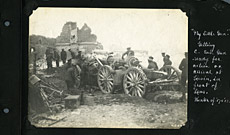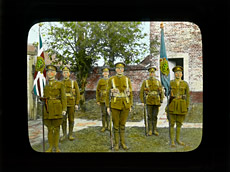Soldiers’ Perspectives on the First World War
November 1, 2013
From the photograph album of Major Horace Hubert Dibblee who served as a Gunner with the 5th and 9th Siege Batteries of the Canadian Garrison Artillery, George Metcalf Archival Collection, CWM 20050172-002 © Canadian War Museum
Newspapers published in the trenches by soldiers for soldiers, containing jokes, amusing anecdotes, cartoons and occasionally poetry. Soldiers’ diaries and photo albums. Pilot log books — including one belonging to Canada’s most famous First World War pilot, Billy Bishop. These are just a few of the personal records of soldiers’ daily life that will soon be accessible to all Canadians through a multi-phase project to digitize thousands of images and objects as part of the Canadian War Museum’s four-year long commemoration of the centenary of the war.
The Museum has already scanned 1,812 magic lantern slides, over one hundred photo albums, selected pages from 66 personal diaries, and 24 pilot log books ― all of which are now accessible to the public through the Museum’s Military History Research Centre’s online catalogue.
The work was made possible by our annual Giving Campaign donors, to all of whom the Museum is deeply grateful.
A unique resource for all Canadians

Glass magic lantern slide of the 38th Canadian Infantry Battalion, George Metcalf Archival Collection, CWM 19630095-002 © Canadian War Museum
By the end of the program, the public, researchers, teachers and students will have access to well over 15,000 images online. As Carol Reid, Collections Specialist for the document archives remarks, “All of these archival documents are so important because they help you see the war through the eyes of the young men and women who experienced it. You get a real sense of how they felt, what they saw, and how they passed their time, and you ask yourself could I do what they did?”
Billy Bishop’s log book not only documents his flight paths, types of aircraft flown, and total flying times; it also includes cryptic and sometimes alarming notes: “Engine failed… Crashed… Caught tree… Bad landing…”
The second and third phases of the project will include scanning more than 340 panoramic photographs of Canadian battalions, as well as views of training camps such as Valcartier. Documents and photographs relating to significant or interesting military individuals from the archives’ collections will be scanned, and three-dimensional models of Vimy Ridge will be photographed. Finally, collections of First World War sheet music, sound recordings, silk embroidered postcards, autograph albums, Rolls of Honour and trench newspapers will also be digitized and linked to the online catalogue.
The panoramic photographs of Canadian battalions and training camps measure up to 2 metres in length. They are a compelling visual testament to the number of Canadians who enlisted in the Canadian Expeditionary Force. “When I look at all of those brave young faces, I can’t help but wonder how many of them returned home,” says Maggie Arbour-Doucette, Collections Specialist for the photo archives.
The trench newspapers — 200 issues from 35 different news-sheets and magazines — were intended to provide information and boost troops’ morale. Few of these newspapers survived the harsh conditions of the trenches but fortunately some were saved by the soldiers or sent home to loved ones. One particular example held in the Museum’s library is titled the Dead Horse Corner Gazette, described as “a monthly journal of breezy comment,” and produced for the 4th Battalion, 1st Canadian Contingent.
The digitization of the George Metcalf Archival Collection, and many other important projects at the Canadian War Museum and Canadian Museum of Civilization, would not be possible without philanthropic support. We would like to thank our donors who have contributed to this work that benefits all Canadians.
By making a donation to this project, you will make more First World War soldiers’ materials accessible to all Canadians online. Please contact Bronwen Dearlove, Major Gifts Officer at 819-776-8687 or bronwen.dearlove@warmuseum.ca or warmuseum.ca/support.